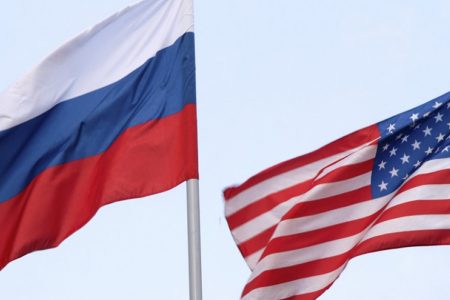In Davos, Jawad Zareef announced that his country is ready to work with Arab neighbours. Some described his speech as hypocritical. A cartoon showed a drawing of Zareef and doves flying out of his speech, next to a drawing of Qassem Soleimani with bullet being fired from his riffle. The comment was: Iran at Davos versus Iran in reality.
However, instead of being cynical at this speech, it is better to undergo an in depth analysis of the situation that led Iran’s foreign minister to make such a statement.
Iran today is at a low point and needs to be in agreement with its neighbours more than ever before. The nuclear deal is described as being “on life support,” by White House Chief of Staff Reince Priebus. The general impression is that lifting sanctions did not entice Iran to change its behaviour so far. Iran interferences have been faced by Saudi reaction. This rivalry has been a main driver behind the turbulences in Iraq, Syria, Yemen and Bahrain. Therefore, the first step to end these regional conflicts would be to reach a Saudi-Iranian agreement.
On the other hand, Iran ideological project in the region is disintegrating. Iran ideological policies have been counter effective; they helped turn friends into foes. After being Iran’s ally for nearly thirty years, Sudan was one of the three countries to cut diplomatic ties with the Islamic Republic in 2016. The intrusive missionary campaign Iran has conducted in Sudan has greatly contributed to the souring of the relationship. In North Africa, a country like Algeria that has had good relations with Iran raised a red flag. The ministry of endowments enacted a law and created a body to enforce it in order to prevent “suspicious activities” pertaining to the campaign aiming at converting Algerians to Shiism. It was viewed as a threat to the national security as well as a danger to the Algerian cultural identity. In Syria, a territory where the Iranians have heavily invested, they see themselves, today, ostracised by the Russians. Facing the uncertain future of Assad, pro-Iranian militias started a campaign of sectarian sorting .They have driven out Sunni inhabitants in strategic cities such as Homs, Qosair and Aleppo and replaced them with Shia Lebanese, Iraqis, Afghanis and Pakistanis, hoping they will be able maintain their influence on the grassroots level , even if Assad is gone. However, this policy is doomed to fail as it is strongly opposed by the Russians who have a different agenda and want a stable Syria to host their bases. The Russians are aware that this policy of sectarian sorting is a recipe for endless problems and this does not fall in line with their plans.
On the other hand, the Shia Iraqis are realising that sectarianism is a way to drive the country into a collective suicide. The patronising attitude of Iran did not help either. On March 8, 2015, Ali Younesi, President Hassan Rouhani’s adviser on ethnic and religious minorities’ affairs, said that Iran historic empire has been restored with Baghdad as its capital. The provocative statement led to a reaction from Shiite cleric Aytollah Ali al-Sistani, who replied: “We are proud of our country, our identity, our independence and our sovereignty. We welcome any help offered today from our brothers and friends in our fight against terrorism and thank them for it; however this does not mean that we would ignore our identity and independence in any way. We have written our history with the lives, wounds and blood that our sons from all communities and ethnicities shed during the battles against terrorism.” This was an indirect and polite way to tell Iran that Iraq will never be part of the imaginary empire suggested by Younesi. On the 30 of April 2016, Sadrists gathered in the green zone to renounce the influence of Iran, which in their view, did nothing but breed sectarianism in Iraq and put in positions of power thugs who pillaged the country. In Yemen, their Houthi allies have not been able to score gains. Recently, they have lost the port of Mocha. Bahrain has also been out of Iran s control.
The Iranian project like any ideological project is doomed to fail due to its totalitarian nature and hence its lack of flexibility and pragmatism. However, the Iranian government is not a monolith. It has ideologues as well as pragmatists. Facing the collapse of the ideological project the worst thing would be to categorically alienate and boycott Iran. Such action will only prolong the survival of the hardliners. Now is the time to engage with pragmatists and to start side track diplomacy.
Side track diplomacy was previously conducted in Switzerland, however it has failed. Saudi has put as a precondition friendly neighbourhood. Iranians refused this precondition that they viewed as condescending. On the other hand, Saudis felt that Iranians involvement in these talks is just a type manoeuvring they use to cover up for their belligerent policies; while in reality they have no intention to compromise or to relinquish on their expansionist agenda.
Now that the leadership is witnessing the collapse of their ideological project, they might be willing to take a more pragmatic outlook at the regional situation. This is why it is important, at this moment in time, to open a window for negotiations with the pragmatists, through side track diplomacy between Saudi and Iran.
Preconditions and pre-conceived ideas have killed the former negotiations. This is why side track diplomacy should happen at two levels. Initially, it should be conducted at a non-official level in order to prepare the common ground for the official talks. Entities such as think tanks or organisations close to the two governments should meet and agree on a term sheet for the second round of negotiations. Each party will go and try to convince the government to which he is affiliated with the common foundation for starting negotiations. The second round should include government officials.
It is not the time to take the speech of Zareef lightly. It might be a signal that Iran is ready to negotiate. Let us not waste this moment. History has shown that the window for diplomacy is usually very narrow .Let us take advantage of it before it shuts down.




